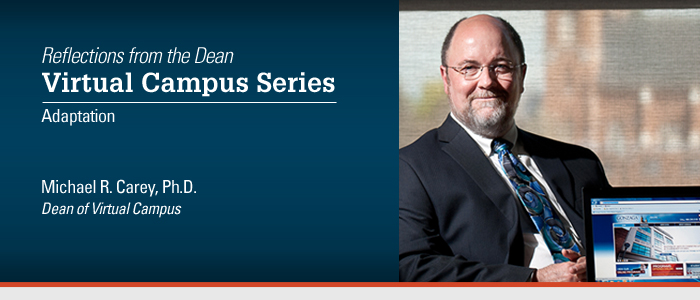Previously I talked about how the Virtual Campus was created to make sure that the Gonzaga transformative learning experience is available to graduate students wherever they are. Accomplishing this goal requires focusing on the learning experience itself, separate from face-to-face or distance modalities. The innovation that such a focus allows is grounded in three Ignatian dynamics: Indifference, Discernment, and Adaptation.
I have already briefly outlined the dynamics of Indifference and Discernment, underscoring that both are about seeing clearly what needs to be done, whether in one’s spiritual life or one’s work life (and Ignatius of Loyola was interested in both, for he was not only a spiritual director, but the CEO of a “company” composed of a thousand Jesuits all over the world). Being ready to let go of the way things have been done in the past, or how you might prefer that they go in the future, is what Ignatius called Indifference. Understanding your own hidden agendas and not-so-hidden prejudices in order to make a decision that is truly best, Ignatius called Discernment. Adaptation is an outgrowth of Indifference and Discernment, and means that you choose what is valuable from a variety of sources and apply it to the work at hand. For Ignatius of Loyola, this meant creating a new kind of religious order that—unlike the monastic Benedictines or semi-monastic Franciscans and Dominicans—was centered on achieving a mission, rather than on creating a community. For the Society of Jesus, this meant being among the first not only to purchase a printing press, but to create more readable typeface. For educators in Jesuit schools for nearly 500 years, this meant adapting teaching methodologies to the circumstances of time and place, and to the actual conditions of the students’ age, education, and abilities.
For the Virtual Campus, Adaptation means that we understand technology as a way to respond effectively to those actual conditions of the students and to the world within which they live. Technology refers to tools, whether pencil and paper or laptop and the internet. If Ignatius of Loyola was alive today, he would make use of the internet, the cloud, and mobile computing technology to achieve the mission of the Society of Jesus. He would do so by focusing on what is essential rather than incidental, and by moving beyond preferences and prejudices to what is required to achieve the mission. The Virtual Campus looks to Ignatius of Loyola as a model of how to proceed, ensuring that it serves as an instrument of the learning experience of the college and professional schools at Gonzaga University.
Thanks for being with me.

